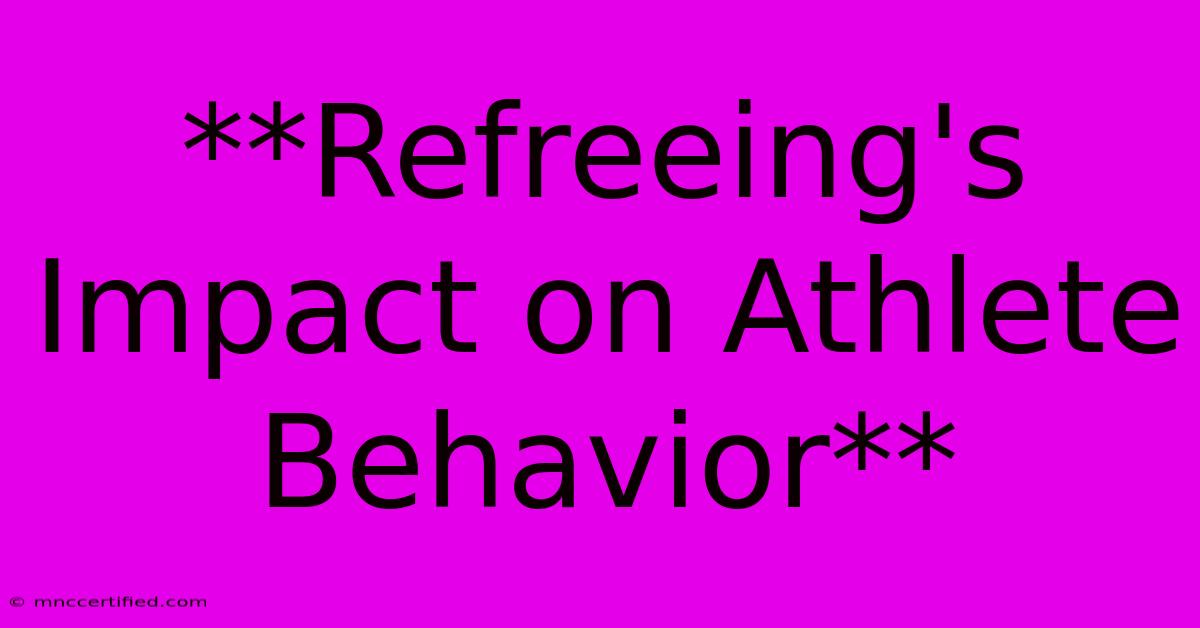**Refreeing's Impact On Athlete Behavior**

Table of Contents
The Whistle's Power: How Refereeing Shapes Athlete Behavior
The roar of the crowd, the sweat glistening under the stadium lights, the thrill of victory – these are the hallmarks of competitive sport. But behind the excitement, a crucial element often goes unnoticed: the referee. More than just enforcers of the rules, referees play a significant role in shaping athlete behavior, impacting the game's flow, and even influencing player performance.
The Referee's Invisible Hand: Shaping Game Dynamics
Referees are the silent conductors of the game. Their decisions, however subtle, can dramatically alter the dynamics of the match.
- Enforcing Fair Play: The most obvious role of a referee is to ensure that the game is played fairly. By calling fouls, issuing warnings, and even handing out red cards, they discourage unsportsmanlike conduct, encouraging athletes to play within the bounds of the rules.
- Maintaining Order: Referees maintain control over the game, diffusing tensions and preventing escalating conflicts. This is especially critical in high-pressure situations where emotions run high.
- Setting the Tone: A referee's demeanor can influence the overall atmosphere of the game. A strict, authoritative presence can create a more disciplined environment, while a more lenient approach might foster a more relaxed and fluid game.
The Psychological Impact of Referees on Athletes
Beyond the physical rules, referees exert a powerful psychological influence on athletes:
- Motivation and Effort: Players are more likely to perform at their best when they perceive the referee as fair and impartial. This sense of justice boosts their motivation and encourages them to give their all. Conversely, perceived unfairness can lead to frustration and decreased effort.
- Aggression and Disciplined Play: The referee's presence acts as a deterrent to aggressive behavior. Knowing that a foul will be called, athletes are more likely to restrain their impulses and focus on disciplined play.
- Self-Control and Emotional Regulation: Athletes must learn to manage their emotions under intense pressure. Referees, by enforcing the rules, help athletes develop self-control and learn to regulate their emotions in the heat of competition.
Refreeing: A Crucial Element in the Game
The impact of referees on athlete behavior is undeniable. They are the unsung heroes who contribute to the integrity, fairness, and ultimately, the enjoyment of competitive sport. Their presence ensures that the game is played within the rules, fosters a sense of fairness and justice, and helps shape athletes into better competitors and individuals.
By understanding the crucial role of referees, athletes can learn to respect their authority and engage in the game with integrity, sportsmanship, and a commitment to playing fair.

Thank you for visiting our website wich cover about **Refreeing's Impact On Athlete Behavior**. We hope the information provided has been useful to you. Feel free to contact us if you have any questions or need further assistance. See you next time and dont miss to bookmark.
Featured Posts
-
Help After House Fire No Insurance
Nov 15, 2024
-
Onion Wins Bid For Alex Jones Company
Nov 15, 2024
-
Sutton Specialty Insurance Company
Nov 15, 2024
-
High Security Match France Draws With Israel
Nov 15, 2024
-
Confirmed Lineups Paraguay Vs Argentina Match
Nov 15, 2024